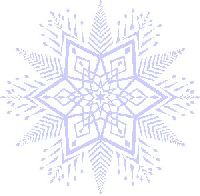
|
presents a detailed summary of:
SIBERIA
by Georgi Mokeevich Markov |

|
 BOOK TWO - Part One: Polya
BOOK TWO - Part One: Polya
1-i. Back in Goleshchikhina, Nikifor has been sent out of town by his father to sell some carts of fish. One cold, snowy morning, Polya and Domnushka are milking cows. Domnushka says she overheard a conversation between Epifan and Anfisa in which they decided to send Polya off on a business trip with Epifan. Polya is to help with the account-keeping. Polya doesn't like the idea, particularly the part about her being separated even longer from Nikifor. She decides that she'll have to visit her father right away. Polya asks Domnushka to tell Nikifor, as soon as he returns, that he should come get her.
1-ii. At breakfast, Epifan tells Polya about his decision to take her on his trip. She asks for permission to drop in on her father first. Anfisa is against it, but Epifan says okay.
1-iii. Polya goes to see her father, Gorbyakov, who is very glad to see her. But when she tells him about her upcoming trip with Epifan, he is less than thrilled. Gorbyakov does not like the idea of his daughter getting mired in the lifestyle of a merchant, a social class he knows is doomed. He hides his feelings from Polya, however, and advises her to go on the trip. After all, he says, she will see many new places and learn first-hand about how merchants do things. Gorbyakov decides that he will soon have to tell Polya about his true political feelings. He promised Polya that when she returns from her trip, they will have to have a long conversation.
|
|
2-ii. After many days of travel, Epifan turns the sleigh into a fir gully, where there is a house standing alone. Epifan tells Polya not to be afraid, but they have come to visit some brother-brigands. Three beardless muzhiks with high-pitched voices--Agafon, Agap, and Agei--come out and respectfully greet Epifan.
|
Legend of Kondrati Selivanov According to legend, the founder of the Skoptsi, Kondrati Selivanov, was in fact Grand Duke Peter Fedorovich, better known as Tsar Peter III. Peter supposedly had a mystical revelation that castration was the only way to salvation and on Christmas Day 1761, the same day as his ascension to the throne, he cut off his penis and hurled it onto his wife's bed. As tsar, Peter was very unpopular and a plot was hatched to assassinate him. Peter was warned of it, however, and he switched places with his official "double" just in time. Peter then changed his name to Kondrati Selivanov, began preaching castration, and by 1771 had a sizeable following. He was arrested, exiled, then confined to a monestary until his death in 1825. Read the full story at: The Knife of Aqedah |
Because their religion doesn't allow them to spend the night in the same dwelling as a woman, the brothers show Polya to separate quarters.
2-iii. In her room, Polya sees coils of many types of rope, from thin ones to very thick ones used to moor boats. One of the brothers (Polya can't tell them apart) brings Polya pelmeni for dinner as well as a feather mattress and pillow. Polya eats and lies down to sleep. She can hear Epifan and the brothers on the other side of the wall, drinking and talking.
In the early morning, Epifan comes into Polya's room. He gives her a ledger and tells her to go over the accounts. He also says that he has some business with the brothers and that they will be leaving her alone for a day or two. Polya doesn't like this, but Epifan tells her that when he brings home the profit, she'll be singing a different tune. He will build a two-story house for her and Nikifor. Polya would be just as happy with her father's simple home, but she doesn't say anything. The brothers leave plenty of food for Polya, then depart with Epifan.
2-iv. Polya wanders around the brothers' property. The barn is locked with a giant padlock. She finds a banya (bathhouse) where the brothers are making samogon (moonshine) laced with tobacco.
Polya wonders at how fate has turned her into a merchant's daughter-in-law. "Cut me with a knife, but I won't get involved in trading and profits," she thinks. Nevertheless, out of curiosity, she opens up Epifan's "secret" ledger. One entry says he bought nuts from a poor peasant family for 1 ruble 25 kopecks per pood and sold them for 3 rubles 20 kopecks per pood--a profit of almost 3,000 rubles! Polya is outraged. She thinks, "What a profiteer! No shame, no conscience!" Even worst, another entry reveals a trick played on some native tribesmen during fishing season. First, Epifan gets them drunk, then he bets another bottle against whatever they pull up from the river with the next toss of their net. If the net comes up empty, they get the vodka anyway. But if they catch something, it all goes to Epifan. And, of course, the net usually comes up brimming with sterlets, white salmon, ide, and sturgeon.
Polya closes the ledger with disgust. She considers taking the horse and running back home, but she knows this will accomplish nothing.
2-v. That night, after Polya has retired, Epifan and the Skoptsi brothers return, drunk. With them is Ermolai Lopatkin. They go to their room and Polya hears as they continue some trade negotiations. Lopatkin has discovered a "pit"--a hidden gully in the frozen river where fish gather in tremendous numbers. According to Siberian tradition, a pit is communal property. Anyone who discovers one is required to report it to the village elder so that the wealth can be shared equally. But so far, Lopatkin has kept his pit secret, and Epifan is trying to buy it. Lopatkin is a tough negotiator. At one point, when Lopatkin is being stubborn, the brothers set upon him and a huge brawl breaks out. There is so much crashing and thrashing about that Polya fears that the walls and ceiling will fall in on her. Epifan then shouts out, "Agap, put down the axe! He's got a knife! He'll kill us all!"
The brawlers quiet down. They drink more vodka and by dawn reach an agreement. Loptakin is to receive a finder's fee plus an additional bonus for every pood of fish pulled out of the pit.
2-vi. Full of loathing for the merchant's lifestyle, Polya decides that as soon as Nikifor returns, she and he will run off and live their own life.
The next day, Marfa Shertobitovskaya, Epifan's lover, shows up. She and Epifan keep Polya awake at night with their noisy love-making.
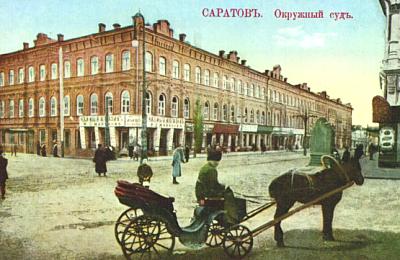 Visit Saratov.ru |
Shustov tells his life story. His wife and five children have joined him in exile and they eek out a living fishing. He has health problems, but is treated by Gorbyakov, upon whom he heaps praise. Polya is thrilled to hear her father so praised, but she refrains from identifying herself as his daughter. Polya likes Shustov and wants to help him. She considers just taking some of the brothers' rope and giving it to him. But the honest Shustov declines the offer and starts to leave. Desperate to help Shustov, Polya tells him the secret of the fish pit. Shustov is shocked at the news, but also energized with the will to prevent injustice. He promises that he and others will find this Lopatkin and prevent the abuse of the fish pit. He also promises to keep Polya's part in this secret.
2-viii. In the evening, Epifan and the Skoptsi return. Epifan says he needs a large sum of cash and he wants to send Polya back to Goleshchikhino by herself to retrieve it. Polya is thrilled at the opportunity of getting out of this place, but she disguises her joy and agrees "reluctantly."
Agap runs in and says that there has been a stranger here...all tracks have been covered over by the snow, but the gate is ajar. Polya lies and says there were no visitors and that it was she who opened the gate.
Epifan gives Polya a letter for Anfisa which says she should give Polya all the cash from the money box.
3-i. Shustov tells the village elder about the fish pit. Muzhiks manage to catch and lock up Lopatkin. Lopatkin turns into a sniveling coward. He reveals the location of the pit and the details of his deal with Epifan.
3-ii. Epifan sees off Polya and tells her to hurry back with the money. He then hires Ostyak tribesmen--led by their elder Yufimka Istegechev--to help fish the pit. They schedule the secret fishing to begin at midnight.
3-iii. In the dead of the night, Epifan feeds the Ostyak and gives them each a glass of vodka, but no more. They arrive at the meeting place, waiting for Lopatkin to lead them to the pit. They wait for a half hour, but Lopatkin doesn't show up. Impatient, Epifan, the Skoptsi, and the Ostyak press onward by themselves, following subtle markers left in the deep snow by Lopatkin.
|
|
4-i. When Polya reaches Goleshchikhino, Nikifor is already there. Polya makes her report to Anfisa, saying that Epifan wants all the cash. Anfisa says, "The morning is wiser than the night", putting off a decision until tomorrow. Nikifor bought a present for Polya, but is so afraid of his mother that he gives it to Polya in secret. He also shows her a puddyovka (light, tight-fitting coat) that he has bought for himself. It makes him look like a merchant, and Polya is not pleased with it.
Nikifor also excitedly tells Polya that he met another merchant's son named Arkady, who taught him how to cheat his father. He claims "shrinkage" and "spillage" of the fish and then keeps some of the profits for himself. Arkady uses his money to visit the "ladies", but Nikifor says he didn't do that. Polya begins to wonder if that's true.
Polya then tells Nikifor about her adventures. She also tells about Epifan's mistress. Polya expects Nikifor to react angrily to this insult to his mother. But he is only mildly amused, saying of Epifan, in effect, "He ain't nothing but a hound dog." Polya is troubled by this. She tells Nikifor, "Let's move out on our own. You promised." But Nikifor is either asleep or pretending to be asleep.
|
|
4.iii Gorbyakov tells Polya about his Party work. She had already guessed as much. She even suspects that he is keeping Akimov safe. Gorbyakov says that's true and that he needs her help in this matter. It has been decided that Akimov should move immediately to the village of Chigar, where he will be met by a guide named Efim Vlasov. Gorbyakov needs for Polya to go to Dalnaya Taiga and escort Akimov to Chigar. Polya readily agrees, but she needs an excuse for not returning to Epifan and for disappearing for four days. They decide that Gorbyakov will claim he is sick and needs Polya to look after him for a time.
4-iv. When she returns to Goleshchikhino, Polya is told by Anfisa that Nikifor will carry the money to Epifan and that Polya will stay with her. Polya says that her father is ill and that she must go tend to him. Anfisa is angry, but holds her tongue.
Polya bids farewell to Nikifor, who talks only of profits.
4-v. As Nikifor travels with the money for Epifan, he happily recalls the debauched hours he and Arkady spent with the "ladies" in town. He's also growing tired of Polya's insistence that they move out on their own. His plan is to take more and more business into his own hands and eventually force his father to retire and hand everything over to him.
Meanwhile, the Skoptsi are seething with rage over the loss of the fish pit. They are certain that it was Polya who betrayed them. They decide to lay in wait for her return, steal the money from her, kill her, and shove her body down an ice hole. Before going to set up their ambush, they gather in front of an icon and pray, asking God's help in committing the foul murder.
Instead of Polya, Nikifor shows up. It doesn't matter. The Skoptsi slit his horse's throat with a knife and smash Nikifor's head with an axe.
|
|
Part Two: Akimov
1-i. While skiing to Dalnaya Taiga, Polya thinks to herself that she must leave the Krivorukov home. If Nikifor won't go with her, she'll have to go by herself. However, she loves Nikifor and she cries over the prospect of losing him.
When she arrives at the cabin in Dalnaya Taiga, she finds Akimov working on his map of the area. With a full beard, he looks older. Fedot is not there because just this morning he set off for Parabel to get supplies.
Akimov fixes some cranberry tea and cooked grouse for Polya. He apologizes that they don't have any dried rusks. Polya is pleased to offer Akimov some fresh bread which she brought along. Akimov savors the bread and says, "Mankind has come up with some amazing discoveries, but bread is the most tremendous of them all."
Polya tells Akimov of the plans to take him to Chigar. Polya is pleased and impressed when Akimov shows her his map of the area, which he says may someday be of use to science. She thinks that perhaps Akimov is a new Lomonosov. She tells him how most people think the area is rotten and useless. Akimov says the land is not to blame for any handships; the guilty party is mankind himself.
Akimov realizes that he cannot take his map with him. Polya promises that Fedot will preserve it for him. Although Fedot is illiterate, Akimov considers him a Professor of Taiga Life.
|
Learn a recipe for:  Ukah (Fish Soup) |
1-ii. Polya and Akimov ski all day. Each wants to know more about the other, but they both know that for the sake of safety, it's better not to ask questions. By evening, they arrive at a small hut. Polya cooks delicious ukha (fish soup). The hut is very small and has only one cot, so--despite the indelicacy--they sleep on it together, their bodies touching.
1-iii. The next evening, they arrive in Chigar. They hide their skis and gun outside the village and continue on foot, following a train of carts returning from Tomsk. The inn where they are to meet Vlasov is crowded and abuzz with activity. The police are inside, guarding three prisoners--deserters, who, instead of reporting for army service, fled and were living in the taiga for a whole year. They were apprehended when an Old Believer informed on them. The expected punishment for the deserters is death.
Suddenly, a whole pack of police arrive and kick all the guests out of the inn. The police are traveling to Narym to learn how better to capture people. Although inconvenienced by the arrival of the police, the travelers don't complain about having to leave. After all, they think, "The farther away from shit, the less the stench."
Thankfully, Vlasov shows up. Akimov thanks Polya for her help, then climbs up into Vlasov's sleigh, and off they go!
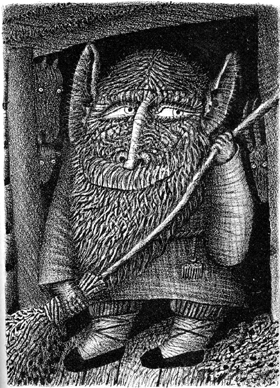 Domovoi (Illustration by Boris Zabirokhin.) |
Vlasov and Akimov stop at the isolated house of Filaret Evseevich, a good-natured hunter and fisherman. Filaret's wife serves them some delicious potatoes and sour cream, then they sleep. Before dawn, they awaken and Filaret's wife serves them a giant carp, which covers almost half the table. Akimov has eaten at some of the finest restaurants in Petrograd, but nothing compares to the luxuriant tastes of this fish. The cook's secret is to soak the fish in milk before cooking so as to get rid of the muddy smell and make the meat more tender.
Akimov remembers Likhachev commenting that tastes improve the closer you are to nature. Likhachev also told him the secret of Siberian pelmeni: Make it from four meats--beef, pork, lamb, and some game animal such as elk, deer, or goat; throw several spoons of strong tea into the dough; freeze it thoroughly, throw into into a hemp bag, and hang outside.
Getting ready to depart, Akimov tries to pay Filaret for his hospitality, but Filaret is only insulted. Once underway, Vlasov tells Akimov never to offer money again. In these parts, he says, it's a sacred duty to give food and shelter to travelers, no matter who they are. Only those nasty Old Believers and Skoptsi would turn away a visitor.
2-ii. Akimov recognizes that they are near the stretches of the Keti River where he and Likhachev spent some of their summers. He thinks of the Ob-Enisei Canal. Although it has lost much of its importance because of the new railroads, Akimov thinks it will be important in the future, providing access to the Arctic Ocean, which the future Russia will not ignore.
| Yurt = Circular, domed portable tent |
Egorsha offers to have his wife sleep with Vlasov. Vlasov refuses, knowing that if he accepted, Egorsha would demand Vlasov's wife or daughter in return if he ever visited the Vlasov home.
Nikolka enters. Akimov is surprised and worried when he sees that Nikolka is just a skinny, 15-year-old boy. Nevertheless, Egorsha and his wife treat Nikolka with respect, giving him the biggest piece of meat. They ask how his hunting went. Nikolka responds modestly, saying not too well. Vlasov, however, knows that this is false humility typical of indiginous people--they don't want to boast in fear of offending the Lord of the Taiga, who will then stop sending game into their traps. Nikolka wants to go hunting elk tomorrow, but Egorsha tell him that he must guide Akimov to the Stepanikha Ridge. Vlasov gives Nikolka a present of some tobacco. Nikolka gives some of the tobacco to each of his family members. (Egorsha's mother greedily starts chewing her portion.) Nikolka happily smokes a pipe, and they all go to sleep. Akimov finds sleeping without a pillow difficult.
2-iii. Akimov and Nikolka set off on their journey. Because Nikolka wants to return that same night, they essesntially race through the snow on their skis. Akimov gives Nikolka some fancy-schmansy tobacco he received in a package from comrades back in Petrograd. Nikolka tries it, but prefers his own simple, coarse blend. Along the way, Nikolka shoots a grouse.
When the finally reach the Stepanikha Ridge, they find an empty hut--Akimov's new guide has not yet arrived. The hut is very similar to Fedot's hut, with matches, dry bread, etc., all kept in the same place, according to the traditions of Siberia. They eat the grouse, then Nikolka leaves to return home.
|
|
|
|
Akimov shares his fish dinner, and they discuss politics. Stepan is pessimistic. All the young men are disappearing at the front, and all the experienced revolutionary leaders are either in exile or in hiding. There is no one to provide the needed controlling hand. Akimov counters that the revolution is getting nearer by the hour, and he assures Stepan that leadership will appear when needed.
|
them thar taigas! Learn more about: 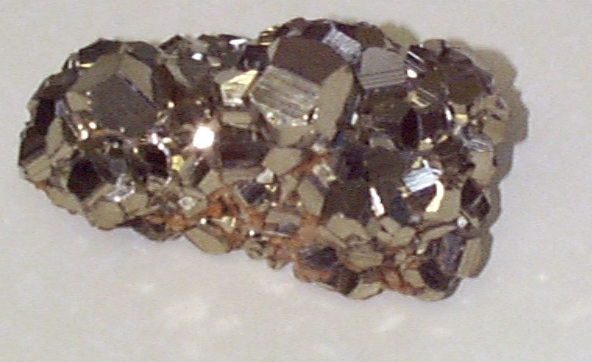 Pyrite (aka "Fool's Gold") |
3-iii. Stepan shows Akimov a bullet which he made himself. Akimov examines it with great curiosity, even smelling it. Akimov asks where the metal came from. Stepan describes how he found the strange, hard rock one day while hunting. He recalled the stories that the Tungus used to make their own bullets and buckshot. Previously, he didn't believe these stories, but now.... Stepan built a very hot fire, extracted the metal, and made some bullets out of it. Akimov asks if he can keep the bullet to show his uncle, Professor Likhachev. Stepan readily agrees, recalling the days he spent with Akimov and Likhachev as the best of his life.
Stepan again comments on the difficult, oppressive times. It's like an extraordinarily hot day in summer. You feel you can't breathe and your heart will leap out of your chest. You look and hope that a storm is coming. Exhaustion and expectation. Stepan dearly longs for a different life, but he doesn't know exactly what type.
|
Siberian Explorer and Writer: 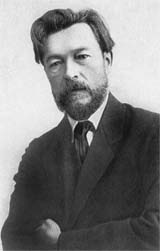 Vyacheslav Yakolevich Shishkov |
They arrive at a hut where Stepan had intended that they spend the night. They are surprised to see that a crowd is gathered there. Seveteen muzhiks have come here to hide out and avoid police duty. It seems that in a nearby village some soldiers, on their own initiative, broke open a storehouse and distributed the grain therein to the people. Authorities, of course, were somewhat miffed. To prevent this sort of thing from happening again, they called up muzhiks and demobilized (i.e., injured, crippled, deformed) soldiers to form an armed militia to guard other storehouses. The muzhiks were not keen to undertake such an assisgnment, so they fled here.
Akimov marvels that here, in the remote backwaters of Siberia, such revolutionary, antimilitary spirit is flourishing, despite that fact that the muzhiks have probably never heard a word of Bolshevik agitation. Akimov thinks, "Lenin is a thousand times right when he says that reality itself will clear the way for our ideas."
Stepan says that Akimov is a representative of the Transport Ministry, who is surveying the area for for upcoming river work. No one believes this. They see that Akimov is obviously a city person and ask if he's heard any news from the war. Akimov boldly tells them that the only way to end the war is to overthrow tsarism.
|
|
3-v. Akimov and Stepan spend the next night in the ruins of an Old Believers' Convent on the shore of a lake. In the old days, girls from all over, even from foreign countries, where shipped off to languish here. Hunters call the lake "The Virgins' Tears"--many young women tied stones around their necks and leapt into the lake. For a long time, it was impossible to catch fish here...they were dining on human remains and not interested in any fisherman's bait. Now, hunters use the head nun's cell for shelter during winter months. Stepan has also used it to hide other escaping prisoners.
Although he's not certain that it's the right thing to to, Stepan tells Akimov about Professor Likhachev's papers--drawings, maps, notes, diaries, etc.--that he is keeping. Akimov is excited and wants to take them with him. It is too dangerous for Akimov to go to Stepan's village to retrieve them, so Stepan will have to go for them by himself.
3-vi. The next day, they arrive at the hut of Okenty Svobodny (Book One, Part 2, 6-vi). Akimov is stunned to see Katya there. They happily embrace.
4-i. After dinner, Stepan leaves to go get Likhachev's papers, and Okenty departs to trade some fish for flour, leaving Akimov and Katya alone. He asks if she got his letter from prison. She replies happily that she did and that she keeps it close to her heart in a secret pocket. They declare their love for one another and kiss passionately. Katya knows that this is a happiness which comes only once in a lifetime. She will forever remember this day, the eve of 1917. Who knows what the new year will bring...maybe happiness and freedom for everyone.
Akimov picks up Katya and lovingly lays her down on the bed. (Nudge-nudge, wink-wink).
|
Propaganda Leaflet Is the Siberian peasant Ziniaida Novoselova alone in her cruel fate? The whole of the Russian land groans. For three years now, more than 12 million workers and peasants have been shedding their blood in a senseless, fratricidal war. The war has not brought and will not bring deliverance to the people. Louder and stronger across the entire nation is heard the slogan of the party of the Social-Democratic Bolsheviks: Down with the war! Down with autocracy! Long live the revolution! |
Katya and Akimov then step out into the clear night air of this New Year, 1917. Akimov greets the New Year, hoping that it will flourish and bring joy to humanity.
4-iii. Just before dawn, Stepan returns with Likhachev's papers. Akimov excitedly looks them over. He is particularly thrilled by a map of Siberian kurgans (burial mounds). Unbeknownst to Akimov, at that very moment in Stockholm, that scoundrel Osipovsky (Book One, Part One, 4-vii), is thinking about that very map. Osipovsky wants the map so that he can dig up the kurgans and steal all the golden artifacts and jewels buried there.
Akimov eats breakfast. Petka (Book One, Part Two, 6-ii) arrives with a sleigh to take Akimov on the next leg of his journal. Akimov takes the sack with Likhachev's papers and departs. Katya watches him leave, then bursts into tears
4-iv. By evening, Petka and Akimov arrive in Tomsk. Petka leaves Akimov at the house of Masha (Book One, Part Two, 1-vi). Also there are Nasimovich (Book One, Part Two, 1-i) and Masha's sister, Dusya. Akimov hands over the propaganda leaflet he and Katya wrote. Nasimovich gives Akimov some money and his false passport. Akimov's new identity is that of Konstantin Konstaninovich Pobelsky, an employee of a Swedish-Danish telephone company. Nasimovich says he will give Akimov a hair-cut. He will also go back to his apartment to get a more decent suit of clothes for Akimov--the taiga outfit just won't do. Akimov asks that Nasimovich also bring newspapers, so he can bring himself up to date on happenings in the world.
4-v. Stepashka, the brother of Masha and Dusya, reports to his work as porter and delivery person for a hardware warehouse. The clerk, as usual, shouts at him rudely for no reason at all. Dusya unexpectedly arrives and says that Nasimovich wants Stepashka to pick up Akimov and take him to the nearby village of Bogasheva. This is not the first time Nasimovich has used Stepahka for secret work. Once, Stepashka delivered Bolshevik literature to an army post, hidden in a box of nails.
Stepashka chooses deliveries as close to Bogasheva as possible and sets out.
4-vi. Stepashka finishes his deliveries and starts driving his sleigh to pick up Akimov. As he nears the assigned meeting place, Stepashka is stopped by three soldiers, who simply sit in the sleigh and say they are riding with him to the Luchanovka glass factory.
When Akimov sees the soldiers, he is about to run off. But Stepashka calls to him by a false name and explains to the soldiers that he is one of the company stewards. Akimov, understanding the ruse, gets in the sleigh. The rest of the trip is uneventful. The soliders get off at Luchanovka, and Stepashka takes Akimov on to Bogasheva, where he intends to catch a train for Petrograd and parts west. Feeling sorry that Akimov has to sneak around, Stepashka says that the revolution will soon come and the next time Akimov visits, instead of hiding in the shadows, he will be able to proudly walk down the main street.
5-i. On one particularly stormy night, Fedot and Gorbykov are sitting in their home as the wind howls fiercely. Fedot reminds Gorbyakov of the folk belief that, when the wind sounds like a hundred voices singing, bad news is soon to come. Gorbyakov dismisses such superstition. But Polya suddenly arrives--Gorbyakov is wanted urgently at Epifan's house. Everyone there is greatly distressed by Nikifor's mysterious disappearance.
Police constable Filatov is already there when Gorbyakov, Fedot, and Polya arrive at Epifan's. Nikifor has been gone for two weeks. Filatov suggests that perhaps he's just off on a drunken bender or conducting some business of his own. Domnushka suggests that the Skoptsi might have killed him. Epifan dismisses this idea, saying that the Skoptsi are gentle fellows. Fedot offers that maybe the wolves ate him.
Inquiries are made throughout the region, but after three more weeks, there is still no news about Nikifor, and everyone loses hope of his ever returning. Anfisa becomes increasingly rude and insulting to Polya. Finally, Polya can take no more and announces that she is leaving forever. Anfisa is stunned and begins sobbing. She falls to her knees and kisses Polya's hand, saying that she was mean to Polya out of fear--fear that Polya would come to control not only Nikifor, but also the entire household. Anfisa's declaration seems so heartfelt and sincere that Polya is about to forgive her, but Domnushka warns Polya not to believe Anfisa's show. That very night, Polya returns to her father's house.
|
|
Glafira soon does take a trip. She goes with her husband as he makes the rounds of the Ostyak and Tungus tribesmen. Vonifati intends to baptize the new children, perform marriages, and say masses for those who have died in the last two years. He also knows that he'll come back with some booty--furs, fish, meat, cedar nuts.
Along the way, Glafira is stricken with typhus. She and Vonifati return to Parabel. Gorbyakov is summoned, but there is little he can do. Glafira knows she is dying and asks to speak with Gorbyakov alone. She confesses that she does not want to live under the same roof as Vonifati anymore. She condemns his treachery, cruelty, and mistreatment of the innocent taiga tribesmen. She also wants to make sure that Gorbyakov knows that she has loved him from their first meeting. Gorbyakov knows. Glafira descends into delirium, shouting about students and bombs and fires. She dies.
5-iii. Filatov obligingly brings Gorbyakov yet another package of books. As soon as the constable leaves, Gorbykov tears open the binding of one of the books to find his secret message. It contains good news: Akimov has escaped from Tomsk. There are also instructions for Gorbyakov to help yet another comrade escape from Narym.
Fedot comes in and tells Gorbyakov he has relocated the hollowed-out log used to hide secret documents. Gorbyakov makes Fedot promise to guard the log in case Gorbyakov ever slips up and is captured. Gorbyakov also asks if Fedot is willing to help in the new escape. Fedot is ready and willing.
6-i. At Taiga Station, Akimov boards the Trans-Siberian Express, bound for Petrograd. All day he stares out the window at the passing countryside. Everywhere there are reminders of the war--dilapitated huts and fences. The trains stations have also fallen prey to neglect. The crowds are mainly women and children. What few men there are are usually invalids on crutches or with wooden legs. Beggars are everywhere. Trade is in a pitiful state--all you can buy at the stations are pickles, potatoes, mushrooms, and onions. Along the route, military trains pass, filled with gloomy, elderly soldiers with worn-out coats. At night, Akimov studies Likhachev's papers.
Some priests and army officers on the train get into an argument about which will save Russian: guns and force, or prayer and belief in God. Akimov laughs under his breathe at both groups.
|
|
At Boi Station, two railway inspectors get on and very carefully check every passenger's passport. They seem very interested in Akimov. They get off and quickly go to the station office. Akimov picks up his sack and goes out to the platform at the end of his train car. He then leaps onto the train on the next track. The conductor on this train obligingly helps Akimov with his sack and tells him that this is the train to Moscow and that it is leaving immediately. As the train begins moving, Akimov looks back at the station and sees the inspectors and a policeman heading for the very same car that he just departed.
6-ii. In Moscow, Akimov spends just a few hours wandering about. The effects of the war are everywhere here, too. Things are drab and worn out. So are the people. Soldiers are surly and show no respect for the police. Akimov knows that soon the army will turn its weapons against the tsar and that then autocracy and capital will surely fall.
Akimov continues his journey, bypassing Petrograd and heading into Finland.
|
Revolutionary Russian Scientists: | |
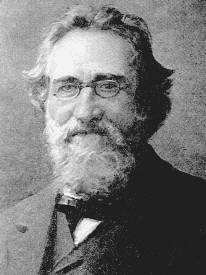 Ilya Mechnikov |
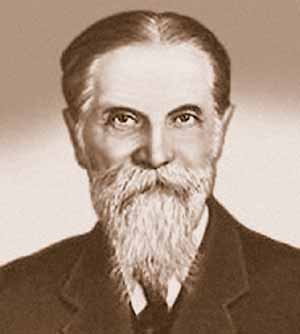 K.A. Timiryazev |
|
|
|
Akimov arrives in the Finnish port town of Abo and is happy to learn that a Swedish freighter is leaving for Stockholm in about 90 minutes. He hires a sleigh to take him to the port. When he arrives, he instructs the driver to take his sack and wait for him at the bottom of the ship's gangplank. Akimov goes to the shipping office to buy a ticket and take care of formalities. When he emerges, he sees his driver, holding the sack, arguing with three policemen. Finland is supposedly independent, but it is a fig leaf...tsarist control is everywhere.
Regretfully, Akimov decides that the only thing to do is to board the freighter and abandon Likhachev's papers.
7-i. Akimov arrives in Stockholm and goes to see Prokhorov (Book One, Part One, 4-viii), who has sad news. Two weeks ago, Likhachev told Prokhorov that he is dying and that he wants to return to Russia to be buried in his homeland. Prokhorov tried to dissuade Likhachev, but the professor was firm. Likhachev sealed his papers in his Stockholm apartment and left for Petrograd. He died three days ago.
The tsarist press kept completely silent about Likhachev, and authorities saw to it that he was buried quickly at a distant cemetery among nameless traders.
7-ii. Prokhorov and Akimov go to Likhachev's apartment and sort through Likhachev's papers. They discover that some papers are missing, stolen, no doubt, by the evil Osipovsky. The missing folders are: "Polymetals", "Mid and Lower Ob (with maps)", "Kurgans", "Gold (with maps)", and "Archeology (volumes 1 &2)".
|
|
7-iii. That night, Akimov goes over Likhachev's notes for his proposed major work on Siberia. This is what he read:
Page One: "Russia's greatness will grow through Siberia," said Lomonosov. Wow, what a genius!
Page Two: All the rivers of Siberia will form a grand highway between Europe and Asia. To keep the rivers passable year-round will require a fleet of ice-cutters, water reservoirs, hydroelectric plants, and solar-energy generators. All these problems will be solved by the year 2000!
Page Three: Western Siberia will prove to be a vast reservoir of oil, gas, and minerals.
Page Four: Agriculture will flourish in southwestern Siberia. The forestry industry will have to operate on the principle of replanting, utilizing a cycle of 50-70 years.
Page Five: The value of the archeological treasures of Siberia is immeasurable. The introduction of foreign capital in the western Altai has led to the shameless theft and desecration of these national treasures. This must stop!
Page Six: Only the Bolsheviks are capable of undertaking the titanic work of transforming Siberia.
Page Seven:
|
|
7-iv. Akimov finishes reading Likhachev's notes and feels inspired. He will get Likhachev's papers in order and will return to Russia in no more than a month to help in the struggle.
He does not know that at that very moment: Autocracy in Russia has fallen. The new Russian revolution has begun.
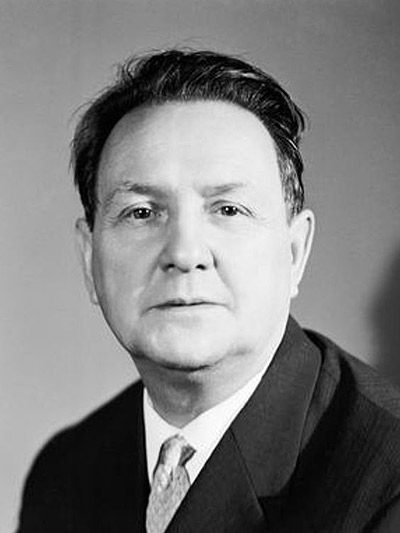 Markov, Georgi Mokeevich. Born on 19 April 1911, near Tomsk, Siberia. He authored the novels Strogovi, Father and Son, Salt of the Earth, Siberia, and To The Future Age.
Markov, Georgi Mokeevich. Born on 19 April 1911, near Tomsk, Siberia. He authored the novels Strogovi, Father and Son, Salt of the Earth, Siberia, and To The Future Age. 